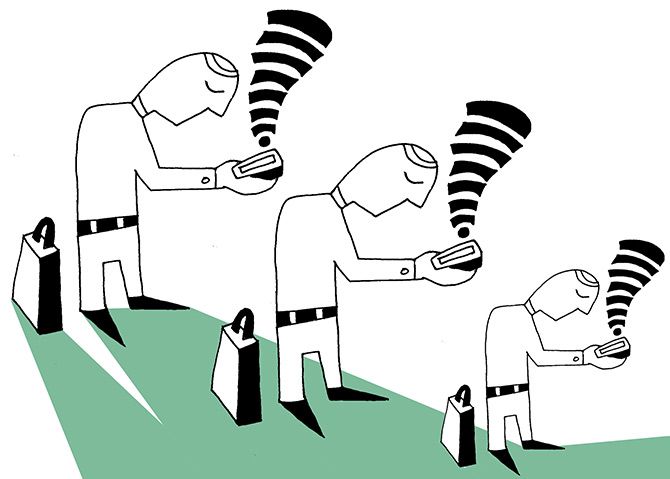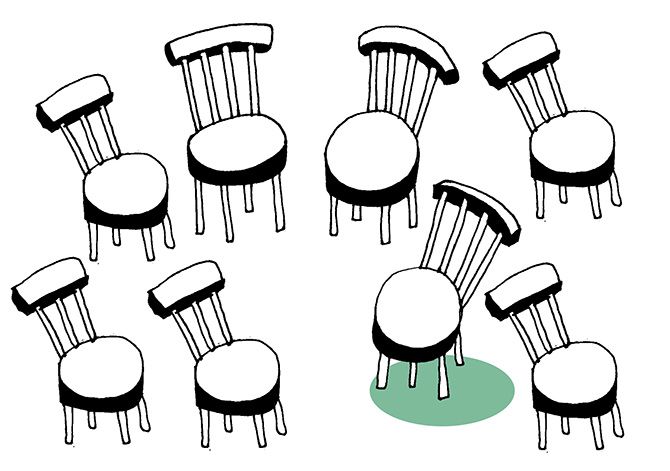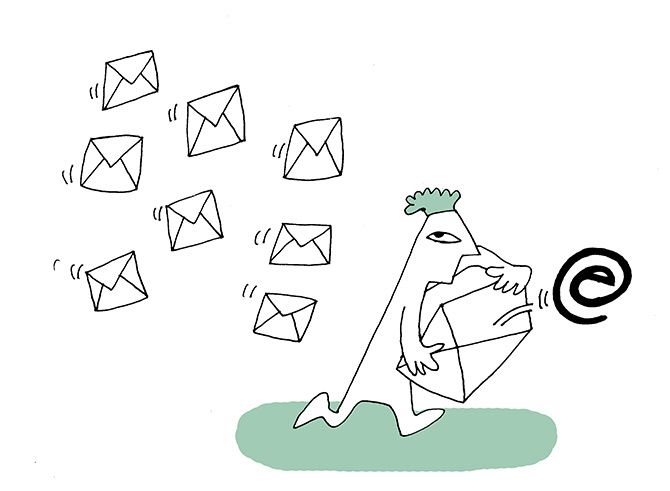'E-mail can become a 24-hour, 7-day/week job if we respond to everything.'
'Be selective, communicate to your teams that you prefer live conversation versus e-mail, and don't be afraid to push "Delete"!'
A fascinating excerpt from Mike Thomas's Agents of Change: Unleashing The Innovation of Real-Life Superheroes.
Illustrations: Uttam Ghosh/Rediff.com

1. Set one to three overarching goals at the beginning of each year and actively prioritise time against them.
This seems like an obvious one, but it is not only critically important but incredibly difficult to do. Why else does almost every New Year's Resolution fail?
I had a success here one year when I decided that I wanted to complete a triathlon to help me get back into shape. I didn't own a bike and had never swum competitively (so why I chose this particular event as a goal is another story in itself!). But I proactively prioritised my time to get this done.
I signed up and paid for the triathlon, bought a bike, and blocked off the necessary time on my calendar each week to train and to prepare. I also told several people I was doing it to help make it real beyond just a goal in my mind.
Essentially, I committed and invested and thus was able to successfully complete my goal that summer.
However, for this one success, I could tell the stories of 10 failures... this takes a lot of discipline and choices, but when done successfully helps to insure that you can do the things that are truly important to you.

2. Set realistic goals each and every day and be deliberate about not only what you WILL do but also what you WON'T.
Setting big goals for the year is important for the big picture, but doing so each day is what ultimately enables success.
Waking up each morning and deciding the tasks that you critically must complete that day is the first step in insuring you address your most important goals.
That being said, deciding what you will complete is actually the easy part... it's deciding what you will not complete that is the real challenge.
For me, I can easily highlight my priorities each day and set out to achieve them. However, I am not good at proactively choosing to not do certain activities, and I thus allow the new events of a given day to distract me from my key goals.
I have often gotten to the end of the day wondering how I failed to complete the only task that was truly important.
It wasn't the failure to set the right priorities but rather a failure to have the discipline to avoid things that can get in the way.

3. Learn to use a big two-letter word... NO.
If you are around small children often, you know that they are the masters of this... "No, No, NO!" rolls easily off their tongues if someone tries to turn their energy from what they want to be doing.
But somewhere along the way, we tend to lose either our ability or our license to exercise this concept that we so easily had mastered as children.
In the workplace, we often feel so much external or self-inflicted pressure to say "yes" to everything that we take on too many responsibilities... and the truly important ones end up lost in the mix.
Simple in concept, but hard in execution, we have to use more two-letter words to focus on what is really important.

4. Learn to ignore the clutter.
This is a big one for me. I have a tendency to put off working on the big things until I can clear some of the smaller, distracting ones out of the way first.
For example, 'I will put that presentation together as soon as I clear out my e-mail inbox' is something I tell myself in the hope that it will help me focus.
The reality is that there never is a time in which the clutter is eliminated and I ultimately end up either compromising the quality of the "big thing" or, more likely, end up giving up an evening at home to address it.
There will always be clutter that can't be totally eliminated, so it must be allowed to fade to the background.

5. If you aren't going to add or receive true value from an event... don't go.
I could spend every minute of every day attending meetings if I accepted everything that came across my desk.
"Let's have a meeting" is commonly the proposal to address an issue, but more than often, these meetings fail to produce a solution... often because we jump too quickly to the perceived "action" of a meeting without the forethought of an agenda.
I recommend avoiding any meeting that does not have a clear and stated objective; there is very low probability that a meeting without a clear agenda will be a good use of time.
And if there is an agenda, I look to determine if there are topics that either require my unique perspective or expertise or will help provide me with knowledge to further my own work.
If I am going to be redundant or if I am going to be getting information that may be interesting but ultimately not useful, I try and avoid the meeting and to use the time more productively.

6. Keep one calendar for your life... not a separate one for work and home.
This is another concept I strongly believe in but don't effectively practise. There is a lot of talk about work/life balance as if they are two separate things.
In reality, in today's world, the line between where "work" ends and "life" begins is blurry (if not non-existent).
Being connected through iPads, Blackberrys, and Computers 24/7 means that we are never truly disconnected from work. And even if we could disconnect, the stresses of work will inherently have an impact at home and vice-versa.
I have always tried to keep things separate and the result has been that I have far too often compromised my home life and my family.
Work produces a lot more "urgent, but not important" requests that can easily trump "important, but not urgent" items at home.
When I have been able to maintain my calendar holistically, it has been far easier to make choices that are better in the long-term rather than defaulting to doing what is best only in the short-term.
There isn't "work life" and "home life"-- there is just "life", and we should manage our time as such.
7. Never forget that PERFECT is the enemy of AMAZING.
For the perfectionists out there, this one may hit home more than some of the others.
To complete a "masterpiece", the first 80% of the work can take 20% of the time, while the last 20% of the work can take 80% of the time.
When we want things to be perfect, investing the time in every last detail does take a lot of extra time.
And for the truly important projects, the time can be well worth it.
The trouble comes when we treat every project, even the small ones, with the same quest for perfection.
If we demand perfection out of ourselves in everything that we do, we are taking a lot of extra time and capacity that could be invested in bigger and more important endeavours.
For most things, "good enough" really is good enough and we should stop at the 80/20 principle.
This allows us to still get the little things done, but to better invest our time making our big priorities "Amazing".
8. Don't entirely delegate your calendar.
Despite the fact that time is our most valuable and precious asset, we often abdicate the responsibility of managing it to someone else.
Don't get me wrong, there is an immense amount of benefits in following a good programme manager or partnering with an administrative assistant to manage the logistics and details of our complicated schedules.
Personally, I have been truly blessed over the years to partner with some amazing people who have been key to my day-to-day survival at work.
That being said, while there are a lot of benefits at the micro level, we need to maintain ownership at the macro level to ensure success.
How much time do we want to spend each week on the things that are most important?
What time must we hold onto for ourselves no matter what "crises" emerge each week?
If we do not own this time for ourselves, then there will always be someone or something that is more than willing to take it and we will lose control of our most treasured resource.
9. It is OK to schedule "spontaneity".
This one is counterintuitive and is another area in which I struggle.
While I accept that my life is far busier than I like, I truly value having the time to be spontaneous and to do something exciting and unplanned.
On the surface, it sounds ridiculous to "schedule spontaneity", and it feels like an oxymoron.
However, at the pace of life today, it is becoming increasingly difficult to have time magically open up to do something outside the demands of work and home.
Deliberately blocking off some space on our calendar to walk the halls and chat with co-workers, to call a friend or colleague we don't see very often, or to have a night out with a significant other is a way to ensure that we make the time to do it.
We don't need to pre-program the time and can be spontaneous within that window, but blocking off the time insures that there is even a window at all.

10. Don't answer e-mails if you don't want to engage further.
I once read that for every e-mail you send, you get eight in return. I don't have any hard data to support that, but it feels about right.

When I feel like I am making progress in responding to the flood of e-mail, I actually end up creating a typhoon of work for myself.
As I look at my e-mails on a given day, the majority can be considered "information only", can be better answered by someone else on the distribution, or can be easily solved with a 30-second conversation.
In these cases, I try to have a "one touch" policy and either file it, forward it, follow up in person, or do nothing.
In all cases, when finished, I delete it and forget about it.
I reserve my e-mails for the issues and conversations that can truly benefit from an exchange of data and perspective, often for working issues with individuals and teams outside of my office and/or time zone.
E-mail can become a 24-hour, 7-day/week job if we respond to everything. Be selective, communicate to your teams that you prefer live conversation versus e-mail, and don't be afraid to push "Delete"!
Excerpted from Agents of Change: Unleashing The Innovation of Real-Life Superheroes by Mike Thomas, with the kind permission of the publishers, Rupa Publications India.










 © 2025
© 2025